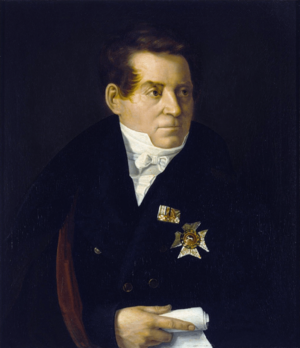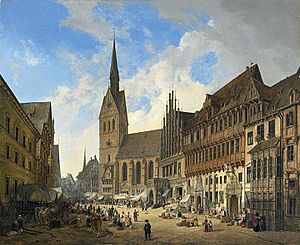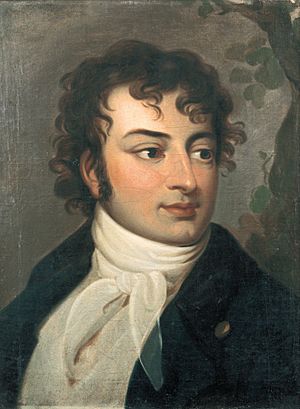August Wilhelm Schlegel facts for kids
Quick facts for kids
August Schlegel
|
|
|---|---|
 |
|
| Born | 8 September 1767 |
| Died | 12 May 1845 (aged 77) Bonn, Rhine Province
|
| Alma mater | University of Göttingen |
| Era | 19th-century philosophy |
| Region | Western Philosophy |
| School | Jena Romanticism Historicism |
| Institutions | University of Bonn |
|
Main interests
|
Philology, philosophy of history |
|
Influences
|
|
August Wilhelm Schlegel (born September 8, 1767 – died May 12, 1845), often called August Schlegel, was a German poet, translator, and critic. He was a very important figure in a movement called Jena Romanticism, along with his brother Friedrich Schlegel.
August Schlegel is famous for translating the plays of Shakespeare into German. His translations were so good that Shakespeare's works became classics in Germany. He was also one of the first professors of Sanskrit (an ancient Indian language) in Europe and translated parts of the Bhagavad Gita, an important Hindu scripture.
Contents
Life and Work
August Schlegel was born in Hanover, Germany. His father was a Lutheran pastor. He went to school in Hanover and then studied at the University of Göttingen. He first studied theology, but he also learned a lot about languages and literature, a field called Philology. He became good friends with Bürger and studied the works of famous writers like Dante, Petrarch, and Shakespeare with him.
In 1790, his brother Friedrich joined him in Göttingen. Both brothers were influenced by thinkers like Johann Gottfried Herder and Immanuel Kant. From 1791 to 1795, August worked as a tutor for the son of a Dutch banker in Amsterdam.
Moving to Jena and the Romantic Movement
In 1796, Schlegel moved to Jena after being invited by the famous writer Schiller. That year, he married Caroline Böhmer. She helped him with some of his writing. They later separated in 1801.
In Jena, Schlegel wrote many articles for literary magazines and continued his translations of Dante and Shakespeare. This work made him well-known, and in 1798, he became a professor at the University of Jena. His home became a meeting place for many "romanticists," including his brother Friedrich, Schelling, Tieck, and Novalis.
The Romantic Movement in Germany was a new way of thinking about art and literature. It was a reaction against the very strict rules of Classicism and the focus on pure logic from the Enlightenment. Romantics often looked back to the spirit of the Middle Ages and valued feelings, imagination, and nature. Schlegel believed that a great work of art creates its own complete world, rather than just copying the real world.
In 1798, August and Friedrich Schlegel started a magazine called Athenaeum. This magazine became the main voice of the Romantic school. They used it to discuss new ideas in literature.
Travels and Later Life
In 1801, Schlegel moved to Berlin and gave lectures on art and literature. He also published a play called Ion. He then translated five plays by the Spanish writer Calderón and published a collection of Spanish, Portuguese, and Italian poems.
In 1804, he met Madame de Staël, a famous writer, in Berlin. She hired him to teach her children. After separating from his wife Caroline, Schlegel traveled with Madame de Staël to Switzerland, Italy, and France. He helped her with her writing. In 1808, he gave famous lectures in Vienna about dramatic art and literature. These lectures were later translated into many languages.
In 1812, he traveled with Madame de Staël to Russia and Sweden. He worked as a secretary for Jean Baptiste Jules Bernadotte, who later became King of Sweden. After Madame de Staël's death in 1817, Schlegel became a professor of Indology (the study of India) at the University of Bonn in 1818. He spent the rest of his life studying Eastern cultures and even started a special printing office for Sanskrit texts.
Schlegel continued to give lectures and publish his critical writings. From 1823 to 1830, he published a journal called Indische Bibliothek (Indian Library). He also edited the Bhagavad Gita with a Latin translation in 1823 and the Ramayana in 1829.
His famous translation of Shakespeare's plays was finished later with the help of Ludwig Tieck and his daughter Dorothea. This translation is still considered one of the best poetic translations ever made. In 1826, the young composer Felix Mendelssohn was inspired by Schlegel's translation of Shakespeare's A Midsummer Night's Dream to write a famous musical piece.
In 1835, Schlegel helped organize a monument in Bonn to honor the famous composer Ludwig van Beethoven. August Schlegel died in Bonn in 1845, just a few months before the monument was officially revealed.
What People Thought of His Work
August Schlegel was not known for his own original poems, but he was an amazing translator. People say he was one of the best translators of poetry. As a critic, he believed that a critic's main job was to truly understand a work of art, not just to judge it.
He continued the ideas of earlier critics like Lessing and Herder. Schlegel was very good at understanding languages and history. He believed that literary criticism should be based on understanding each piece of writing deeply, rather than just using a set of fixed rules.
His lectures on dramatic art and literature were very important. They helped define the terms "classic" and "romantic" in literature. His ideas about Shakespeare also changed how people in England viewed the famous playwright.
His translations of Shakespeare are considered better than any other translations of Shakespeare into a foreign language. Thanks to Schlegel and Tieck, Shakespeare became like a national poet in Germany. His translations of Calderón also made that poet very popular in Germany.
Honors
- Elected a member of the American Antiquarian Society in 1836.
Portraits
- Portrait of A. W. Schlegel by Albert Gregorius (1774–1853), 1817, in Coppet Castle (Switzerland)
Works
- Ion (1803)
- Rom Elegie (1805)
- Poetische Werke (1811)
- Observations sur la langue et la littératures provençale (1818)
- Bhagavad Gita (1823, Latin translation)
- Kritische Schriften (1828, critical works)
- Sämtliche Werke (1846–1848) (Collected Works) published in twelve volumes
- Œuvres écrites en français (3 vols., 1846)
- Opuscula Latine scripta (1848)
Translation
Schlegel's Shakespeare translations have been printed many times. He also translated plays by Pedro Calderón de la Barca, like La banda y flor. This play was later used for an opera called Liebe und Eifersucht in 1807.
Letters
- Ludwig Tieck und die Brüder Schlegel. Briefe edited by Edgar Lohner (Munich 1972)
See also
 In Spanish: August Wilhelm von Schlegel para niños
In Spanish: August Wilhelm von Schlegel para niños
 | Jewel Prestage |
 | Ella Baker |
 | Fannie Lou Hamer |



